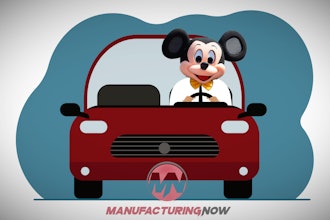As a result of my time in the industry, I understand the business case supporting planned obsolescence – I am simply not a fan when I am forced to dip deeper into my monthly budget for such a clear example of “acceptable” faults in appliances.
When my wife and I bought the house, or as I prefer to call it, agreed to a complicated rental agreement with severe breach of contract consequences, the inspector noted that while the overall basement was in good shape, the bottom of the water heater was going to fall out at any moment.
What a perfect moment to invite my soon-to-be new father-in-law to the house and run a man-errand to the nearby Farm & Fleet to replace the failing heater. The 10-minute drive served as an opportunity for him to regale me on the store’s fine attributes, and reinstate just how lucky I was to be proximally close to such a fine establishment. As he’s from a remote part of Wisconsin, such errands typically require a dedicated half day, considering drive time and small talk.
We park, enter the store, and in an amount of time that still raises his odd jealousy, we’re standing in front of an array of beige cylinders that each promise decades of usable hot water with a limited warranty. We grab the slip for Reliance’s 40 Gallon Natural Gas Water Heater, and load it into the truck.
A plumber came over, and after an hour of work we had a new Reliance in the basement and the old one schlepped out to the curb. We opted for the updated version of the tank in the basement since the previous one had lasted a couple decades (according to the receipt so tediously taped to the tank).
Nearly two years of adequately temperate showers passed by before I stepped into the shower on an early summer Friday, groggy, after a near miss with the bedside dog, and the ramp up time from cold to lukewarm seemed to take longer than normal. As a matter of fact, the water warmed for a moment before switching to a chillingly low temp.
I head downstairs and find the pilot light is out on the water heater. Nothing drastic. I was actually impressed with how easy it is to relight a pilot light. The next morning, same issue, though now the pilot light is unwilling to ignite, and I’m forced to call in the plumber. I can usually wait until we are outside of the emergency plumber premium, but I figured that it might be a quick fix to get us back in hot water before Monday. No such luck.
We called in INaction Plumbing (name changed) and after the assessment, we had our diagnosis: In less than two years, the gas control valve failed. The plumber said his hands were tied, but he left me with a handful of numbers to call, and an honest assessment. “Hey, if you want to pay me $25 for every 15 minutes, I’m happy to call these numbers for you and look for the part,” he added. I happily passed and started dialing, all to no avail.
I was able to reach a few hardware store employees who laughed when I asked if the part was in stock, and one at Home Depot who forgot to mute the phone before cursing out my asinine request. I left a few messages for suppliers who returned the call Monday morning to inform me that not only did they not have the part in stock, but also that only licensed technicians could pick up the part. Just a real twist on the “I couldn’t help you if I tried” lyric. Around this moment, my patience succumbed to anger and I called the manufacturer.
I was happy to hear that Reliance stocked the part, and it could ship to me in, at most, two days, but they wouldn’t cover the part, the shipping, and certainly not the labor. It was then that my anger boiled into righteous indignation regarding planned obsolescence and the downfall of modern society. In hindsight, I maybe took it too far. I only hope the poor customer service representative received a gold star for his ability to apologize and understand while still conceding nothing.
My hands were tied; The only logical thing to do was swear off Reliance water heaters altogether. I’d pay to have it ripped out of my house, and bite the bullet on replacing it with any other available heater on the market. I even debated enrolling in a tech school, learning basic installation, and, after six months without hot water, winning the argument as a newfound DIYer.
It was only then that I had a moment of inspired concession: One-year warranty on parts, but three years for the entire unit. After more than a week working with plumbers, suppliers, and manufacturers, I had a solution. I would never deem it suitable, but at least my wife and I could stop showering at the gym.
Farm & Fleet, guilty only by association with the inferior product, was accommodating. I buy the equivalent unit at the same price, have it installed, and return the defective appliance for a refund. Sure, I’d be stuck with another unreliable Reliance (and the labor), but I bought another three years with the exchange.
INaction came out the next day, and eight days later we were back in hot water. Just as I started breathing normally and my pulse stepped back from the brink, the technician looked at me as I handed over another check and said, “You know, you just should’ve asked. We have an entire shelf of these valves back at the shop.”
Exhausted and incapable of retort, I sighed, showed the man the door, and headed down the hall to cool off with a hot shower. I find it fundamentally unacceptable that quality, in many instances, is so laughably bad that, instead of a conversation about subpar products becoming commonplace, I most often hear, “Well, what did you expect?” I know that I’m at fault for expecting a manufacturer to have a little more faith in its product line. After all, if it doesn’t stand by its product for more than one year, why should I?
What’s your take? Please send similar diatribes to [email protected].
This blog originally appeared in the July/August print edition of PD&D.






















